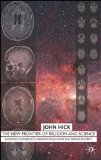‘The New Frontier of Religion and Science: Religious Experience, Neuroscience and the Transcendent’ by John Hick
Written on March 28, 2009
John Hick, a prominent philosopher of religion, published New Frontier of Religion and Science: Religious Experience, Neuroscience, and the Transcendent in 2006. This was one of the books cited by Mark Vernon in Wellbeing, so I decided to check it out.
Hick criticizes mind-brain identity theory and other naturalistic theories of consciousness such as epiphenomenalism and emergence, clearing the way for an approach that supports the validity of religious experience. He proposes a Kantian account that accommodates religious pluralism. One interesting idea introduced by Hick is that of levels of meaning, physical, ethical and religious, (he could also have included social/cultural) that correspond to increasing degrees of cognitive freedom, so we have the least amount of freedom in relation to physical reality, a greater amount in relation to ethics and the most freedom in relation to religious experience:
(p 145)The supra-natural … environment, whether experienced as a personal God or a transpersonal Reality is always and everywhere there to be accessed, but is not forced upon our consciousness.
This is why, from a religious point of view, experience of the Transcendent is neither universal nor uniform. It is not universal, at any given time, because it is not forced, or does not force itself, upon anyone; and it is not uniform around the world because the human contribution to the forms of authentic religious experience varies within the different cultures and traditions of the earth.
The book could have used some proofreading, as there were a number of distracting errors. Also the first section on institutional religion was a preliminary discussion that could easily be skipped over.
Readers who are open to non-naturalistic theorizing would be most likely to enjoy this book.
Filed in: consciousness,philosophy of mind.



